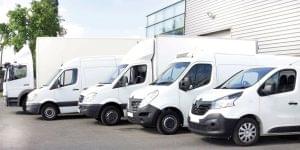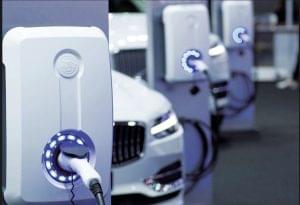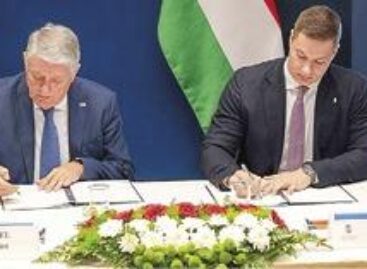Stability in a chaotic world
Delta Truck/VIARENT KFT. can feel the disruptions in the supply chain and the spare part shortage resulting from this. Managing director Zsombor Páll: “Ordered vehicles arrive late or they aren’t delivered at all. Viarent Kft. is trying to solve this problem by offering alternative brands to customers, with the same technical characteristics. In the last two years demand rose for e-vehicles with a relatively long rage. At the moment 5% of our fleet of vehicles lighter than 3.5 tonnes is fully electric. Our goals include promoting short-term – less than 30 days – rental, adding the new Mercedes fleet to our portfolio, and volume growth in both Hungary and Slovakia.”

Telematics systems ensure the most economical vehicle operation based on a number of parameters
A rather gloomy outlook

Sándor Papp
head of sales
Emil Frey
Emil Frey’s experience is that companies prefer buying for cash. Unpredictable interest rate movement and rising costs deter customers from financing schemes. Those who still opt for one of these tend to choose the state-subsidised Széchenyi GO 2.5% scheme. Head of sales Sándor Papp: “Demand for vans and other light commercial vehicles has decreased a little, while on the supply side production capacity is limited. As for electric vehicles, demand could be bigger, but the lack of state subsidy and the necessary infrastructure discourage customers from buying.”

Gergely Lakatos
business development and
marketing manager
EuroFleet
EuroFleet’s opinion is that at times of economic instability the best solution is operative leasing. This is why the company is dynamically increasing its fleet size, as this way businesses don’t need to invest millions in vehicles, and they can use this money for development and other projects. Business development and marketing manager Gergely Lakatos: “Customer demand is growing for our ElectricFleet service, which can be combined with EuroFleet’s E-xtra service: for longer distances, customers can substitute their e-vehicles with diesel cars on an occasional basis.”

Companies have reworked the time spans for replacing their car fleets, they are thinking in the longer term
Plannability is more important than ever before

Eszter Harmat
commercial director
LeasePlan
Global microchip shortage and supply chain problems still hinder the development of the new vehicle market. Plannability and flexibility have become more important than ever before when it comes to company cars. LeasePlan’s most popular schemes are those without long-term commitment – customers like flexible and instantly available solutions.
Commercial director Eszter Harmat: “Our FlexiPlan service provides continuous mobility, partners can rent vehicles for periods ranging from 1 month to 24 months, without committing themselves to fixed lease terms. LeasePlan also offers commercial vehicles and related services to partners.”
Special solutions and tailor-made services

Gyula Szabó
commercial director
Mercarius Flottakezelő
At Mercarius operative leasing has been the most popular service recently.
Commercial director Gyula Szabó: “In the current market situation we must plan vehicle purchases 18-24 months in advance. In parcel delivery demand is growing dynamically for electric vehicles in the cities. Since market conditions have changed, our customers don’t really want classic long-term rental schemes. Mercarius can satisfy their new type needs with flexible mobility solutions.”

Plannability and flexibility of car fleets have become more important for companies then ever before

Sándor Sallai
head of remarketing and fleet management
Porsche Lízing és
Szolgáltató
Porsche Lízing és Szolgáltató Kft. doesn’t only offer operative leasing, but also open- and closed-end financial leasing solutions. From these closed-end financial lease is the most popular.
Head of remarketing and fleet management Sándor Sallai: “This year we came out with a new mobility product, which can solve the problem of customers having to wait for their new car. We also launched a market-leader digital fleet management solution.”
Is e-car the solution?

András Kovács
brand manager
Volkswagen
Commercial Vehicles
Volkswagen Commercial Vehicles is also facing problems resulting from supply chain disruptions. Despite the war in Ukraine, the company only experiences short disruptions, but the reduced manufacturing capacity comes at a time when customer demand is on the rise.
Brand manager András Kovács: “There is steadily growing interest in plug-in hybrid and electric cars. The latter are still rather expensive, but environmentally conscious businesses are already buying them. For many of them the best choice is the newly launched, fully electric ID. Buzz or ID. Buzz Cargo vans.”

E-car means a true alternative only to those who can build out a charging station on their own
Growing e-car market

Gergely Fáczán
director of sales and marketing
Volvo Hungária
Volvo Hungária Kft. reckons that there is no mass demand for e-trucks yet, but interest in them is increasing steadily. So far the company has made 20-25 e-truck price quotations for partners, and one fifth of these resulted in actual orders.
Director of sales and marketing Gergely Fáczán: “Last year Volvo replaced its Dynafleet telematics system with Volvo Connects, which is even more user friendly. The system can plan routes calculating with traffic information, terrain conditions, cargo and type of vehicle. In addition to this, the new system can also check whether the driving style of the driver is economical or not.” //

On account of disruptions in supply chains, vehicle purchases must be planned even 18-24 months in advance
//
FLEETware: Controlling costs

Lajos D. Szabó
business unit manager
Fleetware
In the last few years additional and customisable functions started to gain ground in tracking. FLEETware’s business unit manager Lajos D. Szabó told that rising inflation, increasing energy prices and the expected economic setback make companies want to control their costs even more. Because of this fuel use monitoring and fuel theft protection have become very important for them. Hungarian fleet owners are now also paying greater attention to vehicle-friendly driving style. This year’s plans for FLEETware include introducing a product function for protection from catalytic converter theft. //
MOL: New benefits, new services

István Mosolygó
head of card management
MOL
In the last six months MOL launched several new fuel card related services. From now on MOL Group Gold Europe and Hungary fuel card holders can pay the Hungarian road toll (HU-GO) at the end of the accounting period, thanks to the cooperation between the MOL Group and i-Cell Kft. At the beginning of the year MOL MOVE replaced the former loyalty programme, Multipont. Fuel card owners get loyalty points for payments made using the card. MOL’s head of card management István Mosolygó told that fuel price changes don’t affect the card related services. //
iData: Tracking isn’t enough anymore

Nikolett Zölei
head of sales
iData
NaviTrack is a service by iData that offers a complex solution to transport managers. It can be used in any market segment, and soon a workflow function will also be added to iData – informed head of sales Nikolett Zölei. She added that there are several tracking needs in the market: for many companies simple tracking isn’t enough anymore, they would like to see more services combined with it. There is also growing need for customising the reports for companies, and for integrating tracking into existing systems. iData’s plans include further expansion, monitoring the needs of the Hungarian market all the time and reacting to new needs swiftly. The company wishes to remain a customer-focused service provider. //
Shell: Expanding e-charging station network

Tamás Csabai
head of fleet solutions
Shell
This year three new units were added to Shell’s e-charging station network, two at the service stations in Vác and Hédervár, while in Mosonmagyarország the company opened a B2B charging station especially for trucks. Head of fleet solutions Tamás Csabai told: from the end of 2021 customers can use Shell’s roaming-based B2B e-charging service – Hungarian drivers can charge their e-vehicles at more than 1,700 charging points of 900 charging stations with their Shell Recharge card. //
The above article is available for reading on pp 185-190 of Trade magazin 2022.08-09.
Related news
Coffee and hot dogs at their peak: MOL closes a record year
🎧 Hallgasd a cikket: Lejátszás Szünet Folytatás Leállítás Nyelv: Auto…
Read more >Clear view even in winter – with Shell’s new 3.5-litre premium windshield washer fluid
🎧 Hallgasd a cikket: Lejátszás Szünet Folytatás Leállítás Nyelv: Auto…
Read more >Related news
Affordable luxury, forgivable indulgence
🎧 Hallgasd a cikket: Lejátszás Szünet Folytatás Leállítás Nyelv: Auto…
Read more >







